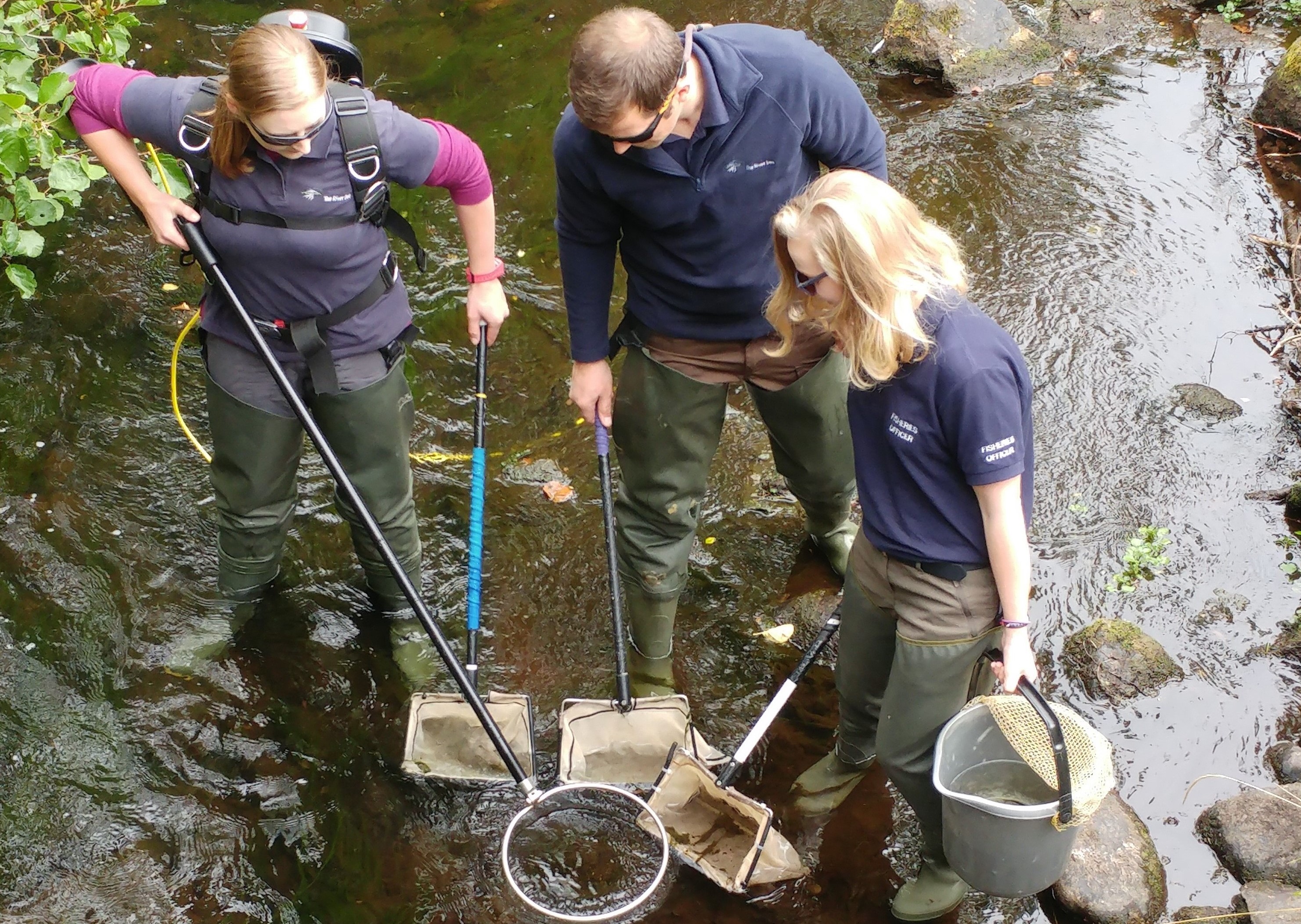
Project Officers will plan and co-ordinate project activities of river restoration and habitat enhancement , including scheduling, reporting and delivery of outcomes. They will support all areas of an initiative’s work, supporting the delivery of a management plan for a catchment area, making sure these are delivered within an agreed timeframe and budget.
Project Officers will need to maintain effective communications between partners and ongoing involvement with a wider stakeholder group – this may involve community engagement events and activities. There will also be a lot of surveying and record keeping, to allow any outcomes and impacts of the project to be evaluated.
Also known as: Project Support Officer
You’ll need:
good understanding of water environment, rural development issues and relevant environmental legislation, policy and guidance
to work well with others, but also be able to work on your own when needed
good communication and negotiation skills, and be able to deliver complex messages in a way that is understood by a diverse audience
excellent organisational skills, to plan the use of people and resources to meet deadlines
some understanding and experience of carrying out field work
to be thorough and pay attention to detail
IT skills to produce reports, maps and models
Project Officers may be required to provide training and co-ordinate any volunteers who are supporting the project. A full driver licence and access to a vehicle can be useful, as can previous experience of working or volunteering on projects. A full DBS, Disclosure Scotland or Garda Vetting check may be required if the role involves working with children or vulnerable people.
You might need to take short courses to learn techniques such as electrofishing. Holding tickets in relevant practical skills e.g. chainsawing, brushcutting, dumper or excavator operating will be useful.
Around 37 hrs/week following normal business hours Monday to Friday, but positions can be part-time depending on the needs of the project.
Engage with the local community, river users, conservation groups and land managers, fostering positive relationships
Design and implement projects along the river, both working with volunteers and securing contractors
Recruit and train volunteers
Carry out surveys of the river to identify access issues, environmental and water quality improvements, invasive species and fish migration barriers
Educate stakeholders and organise training on river restoration
Run public and stakeholder events and talks to promote the project
Represent the project in relevant meetings and conferences
Ensure that the project runs to budget and meets deadlines
Some tasks involve working outdoors in all weather conditions and may require the use of protective clothing (PPE). Others will be desk-based or involve travelling to sites to visit local stakeholders.
Training is an essential part of any job, giving you the skills and knowledge you need to do your job safely and correctly. It also helps to strengthen your current skill set and prepares you for the next stage in your career.
Apprenticeships help you build the experience and skills that employers want to see. No matter what stage you’re at, they’ll help set you up for a bright future. There are lots of ways to get involved.
You'll develop transferable skills, which will help you progress either in project management or general management opportunities. To help your career prospects, you may want to look into joining professional bodies and undertake further qualifications to make sure your skills are up to date.
There are also opportunities to move into policy roles within the public sector or to set up an independent consultancy. You could also go into academic research and lecturing in your specialist field.
Project Officer will usually work in one of the following industries. Click below to find out more about possible career paths.
The popularity of angling brings lots of different opportunities to work in both wild and managed fisheries.
The industry needs enthusiastic, skilled workers to help protect and restore our rivers and fisheries and grapple with issues like climate change, pollution, overfishing, catchment management and changing freshwater habitats.
Jobs in fisheries management involve looking after wild fish stocks and their freshwater habitats, as well as working in commercial stocked fisheries.
Day-to-day tasks might include monitoring and surveying, managing fishery habitats, investigating fish health and stock levels, maintaining water quality, or doing technical project work. If you like working with the public then there are lots of opportunities to share your knowledge of sustainable fishing, or you may even get the chance to help enforce regulations to protect fishing and its habitats.
There is estimated to be over 3 million recreational anglers in the UK
Fish are a good indicator of river ecosystem health as well as supporting recreational and commercial fisheries
Recreational coarse and game fishing is a major tourism activity, providing direct financial benefits to local economies with almost all the spends going directly into the local community
It is estimated that more than 150,000 people participate in an angling activity each year in the Republic of Ireland, contributing a significant amount to tourism and recreation economies
These courses are perfect if you are starting out on your career but they are also great for people already in jobs who want to improve their skills.
To find out more about qualification levels in England please visit Regulated Qualifications Framework (RQF) for England and Northern Ireland or Framework for Higher Education Qualifications for England, Wales and Northern Ireland (FHEQ) .
To find out more about qualification levels in Northern Ireland please visit Regulated Qualifications Framework (RQF) for England and Northern Ireland or Framework for Higher Education Qualifications for England, Wales and Northern Ireland (FHEQ).
To find out more about qualification levels in the Republic of Ireland, please visit National Framework of Qualifications for Ireland (NFQIE)
To find out more about qualification levels in Scotland please visit Scottish Credit and Qualifications Framework (SCQF).
To find out more about qualification levels in Wales please visit Credit and Qualifications Framework for Wales (CQFW) or Framework for Higher Education Qualifications for England, Wales and Northern Ireland (FHEQ).
| Title | Level |
|---|
These courses are perfect if you are starting out on your career but they are also great for people already in jobs who want to improve their skills.
Whether you’re just starting out in the workplace, want to upskill or are considering changing direction, Apprenticeships are a fantastic way to build your career. Apprenticeships combine work with on-the-job training, so if you want to earn as you learn, there’s an apprenticeship out there for you – you can even start an apprenticeship if you already have a degree.
Work, earn and learn – no matter where you are in your career, an apprenticeship can set you up for a bright future.
Let’s get started!
Want to take on an apprentice? Employers start here.
An apprenticeship is a unique blend of work experience and study to help build the skills and knowledge you need for your career. Apprentices are employees – they have a contract, are paid and get the same benefits as everyone else. But the difference between an apprenticeship and a normal job is that apprentices are regularly released from work for training. Sometimes that’s a day a week, sometimes it’s for a longer block – it all depends on the job and the apprenticeship.
Apprentices work for all kinds of people at all kinds of stages in their lives. Most apprentices fall into one of three categories:
Previously restricted to school leavers and young people, apprenticeships are now a dynamic way of retraining people of all ages - there’s no upper age limit. The minimum age to become an apprentice is 16 and candidates can’t be in full-time education.
Apprenticeships offer a unique combination of paid work and study. They’re an exciting option for anyone who wants to gain experience, upskill or change career while working.
They offer a chance to work, learn and earn:


Interested in becoming an apprentice? Search for current opportunities and apply here.
Find your apprenticeship
You can also check vacancies on employer websites or get in touch with your local careers service.
What’s it like to work, earn and learn? Find out what apprentice life is really like.
Explore apprenticeship stories
Institute of Fisheries Management
Find out more
Canal & River Trust
Find out more
British Trout Association
Find out more
Fisheries Management Scotland
Find out more
The Angling Trust
Find out more
Ulster Angling Federation
Find out more
Thinking about your finances is important when you're looking at courses and training - different types of funding support is available depending on what type of course you're interested in and where you are located. We recommend you contact the training provider for more information on course costs and financing, but here are some links to connect you to support available:
Skills Hub Scotland is an online skill sharing marketplace creating new opportunities to learn and share skills. Wherever you are located - if you have a skill to share, or a skill to learn, Skills Hub Scotland can help.
Initially founded as a response to the Scottish Government’s CivTech 5 programme in 2020 and aiming to offer a platform for those in rural or remote locations, Skills Hub Scotland has been developed into an important sectoral resource. If you have a skill to share with others or are a training provider, list your workshop or course (all skills from all sectors are welcome). If you are a learner, use Skills Hub Scotland to search for and book a course!
STEM is an approach to learning and development that incorporates the areas of science, technology, engineering and mathematics. Learning in STEM connects to Education for Sustainable Development/Learning for Sustainability and the Sustainable Development Goals – this helps learners to understand that STEM plays a vital role in finding solutions to real world issues or challenges such as protecting biodiversity and tackling climate change. There are multiple pathways into a land-based STEM career including apprenticeships, further and higher education. This means that a career in STEM is open to everyone!
STEM Learning is the largest provider of STEM education and careers support in the UK. Their STEM Ambassadors programme sees volunteers representing a vast range of STEM-related jobs work with young people to bring STEM subjects alive through real life experiences. They help to open the doors to a world of opportunities and possibilities which come from pursuing STEM subjects and careers. To become a STEM Ambassador, you can register via the STEM Learning website: https://www.stem.org.uk/stem-ambassadors/join-stem-ambassador-programme
Lantra have worked in collaboration with STEM Ambassadors in Scotland to create two specific UK-wide Ambassadors schemes - Forestry and Aquaculture. Through these schemes, we want to make sure that those working in forestry and aquaculture have the support materials they need to take part in STEM activities. To find out more and register for the schemes, please follow the links below:
Smart Futures helps young people in Ireland discover the STEM subjects and careers that might be right for them. Co-ordinated and managed by Science Foundation Ireland, their programme allows young people to connect with people that are working in STEM, the organisations they’re working in and what their interests and skills are.
Why not take a look at the Industries Explorer as an introduction to the different areas you could work in.
If we can support you with any specific information, please click the button below to get in touch.